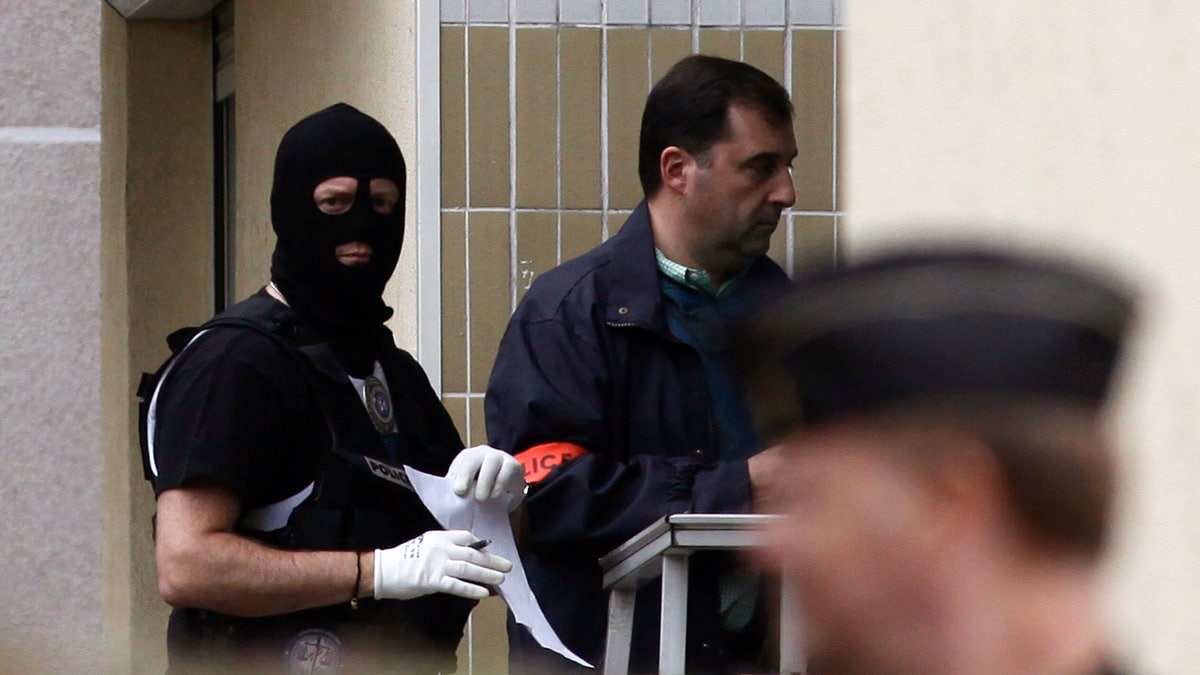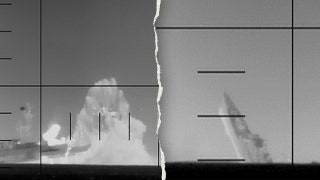
French police officers stand outside a building where authorities discovered bomb-making material after the break up of a suspected terrorist cell last week, in Torcy, east of Paris, Wednesday, Oct. 10, 2012. French police discovered bomb-making materials in an underground parking lot near Paris as part of a probe of an "extremely dangerous terrorist cell" linked to an attack on a kosher grocery, a state prosecutor said Wednesday. (AP Photo/Thibault Camus) (AP2012)
PARIS – A network of French Islamists behind a grenade attack on a kosher market also planned to join jihadists fighting in Syria, a state prosecutor said Thursday, calling the suspected terrorist group potentially the most dangerous established in France since the 1990s.
Five of the 12 people arrested in sweeps in cities around France have been freed, said the prosecutor, Francois Molins. He said seven people remain in custody a day after police discovered bomb-making materials in an underground parking lot as part of a probe of an "extremely dangerous terrorist cell." The seven, aged 19 to 25 years old, were all born in France, he said.
The Sept. 19 attack on the market in Sarcelles, outside Paris, shattered windows and injured a customer at the store. It has revived French concerns that home-grown Islamic militants want to link with international jihad and carry out terrorism in France -- this time, notably, against Jewish targets.
"The intent was to kill," Molins said. "It was just lucky that it (the attack) didn't have the consequences desired by the culprits." He noted that despite five days of questioning, when those held were mostly uncooperative, it was not clear whether the two culprits of the attack were in custody.
Nonetheless, the prosecutor hailed "the dismantling of a terrorist group that is probably the most dangerous brought to light in France since 1996." Back then, Islamic militants linked to a bloody insurrection in former French colony Algeria carried out a series of bombings in France.
Molins said that the bomb-making materials turned up in the underground garage could have been used in "exactly the same type of construction and mechanism used in 1995 by GIA activists" -- the French acronym for the now-disbanded Armed Islamic Group in Algeria.
In Syria, most of those fighting against President Bashar Assad's military are believed to be ordinary Syrians fed up with the authoritarian regime and soldiers who have defected, analysts say. But increasingly, foreign fighters and those adhering to an extremist Islamist ideology are becoming involved. Two British nationals were arrested Tuesday at Heathrow Airport on suspicion of supporting terrorism in Syria.
French authorities have been on high alert for possible terror attacks by radical Islamists after Mohamed Merah, a Frenchman who claimed links to al-Qaida, shot and killed three Jewish children, a rabbi and three paratroopers in southern France in March.
French authorities opened a judicial investigation Thursday over the Sarcelles grocery attack for attempted murder -- notably on the basis of the potential victims' religion and in connection with a terrorist organization, the prosecutor said. Related potential charges included the illegal possession of explosive devices, theft, use of stolen property, and illegal possession and transport of firearms.
It's now up to investigating judges whether to file preliminary charges.
The case involves two components: The kosher grocery attack, and the recruitment network. The prosecutor wants seven charged in connection with the alleged jihadist recruiting network, and six of them in connection with the grocery attack.
Two suspects "had the mission of recruiting and sending individuals to carry out jihad in some countries -- notably Syria," Molins said. Two members of the cell had recently spent three months each in Tunisia and Egypt, though police interrogations haven't turned up why they were there, he said.
DNA traces found on the grenade led anti-terror police to Jeremie Louis-Sidney, a 33-year-old convicted drug dealer who, Molins said, converted to radical Islam in prison. Louis-Sidney was killed in a shootout with police on Saturday. He was one of the men who had traveled to Egypt and Tunisia.
The only other suspect identified by name was Jeremy Bailly, who -- instead of Louis-Sidney as first thought -- appeared to be the group's ringleader, Molins said. Bailly had rented the garage where the explosives were found, and investigators found a key to it in his home.
Police investigators turned up five final "testaments" -- or wills -- that contained "religious recommendations that consisted of saying, `the day that I won't be here ... respect your Muslim duty, give my iPod to my sister, such-and-such item to my brother-in-law,' etc.," Molins said.
Molins said it was "too early to tell" whether the suspects had contacts with known Islamic militant groups abroad.
French investigators believed they headed off a potentially deadly terror attack, though it was unclear what the target might be. Bailly told investigators that "he wanted indeed to build a bomb, but without naming either his accomplices or his target," according to Molins.
The international link revived memories of the height of the Iraq war in the mid-2000s -- when French counterterrorism authorities dismantled a string of feeder cells that sent or plotted to send fighters to join the combat against U.S.-led allied forces there.
A French counterterrorism official told The Associated Press on Wednesday that authorities have noticed a recent trend in which young French militants have been lured by the prospect of jihad in Syria.








































